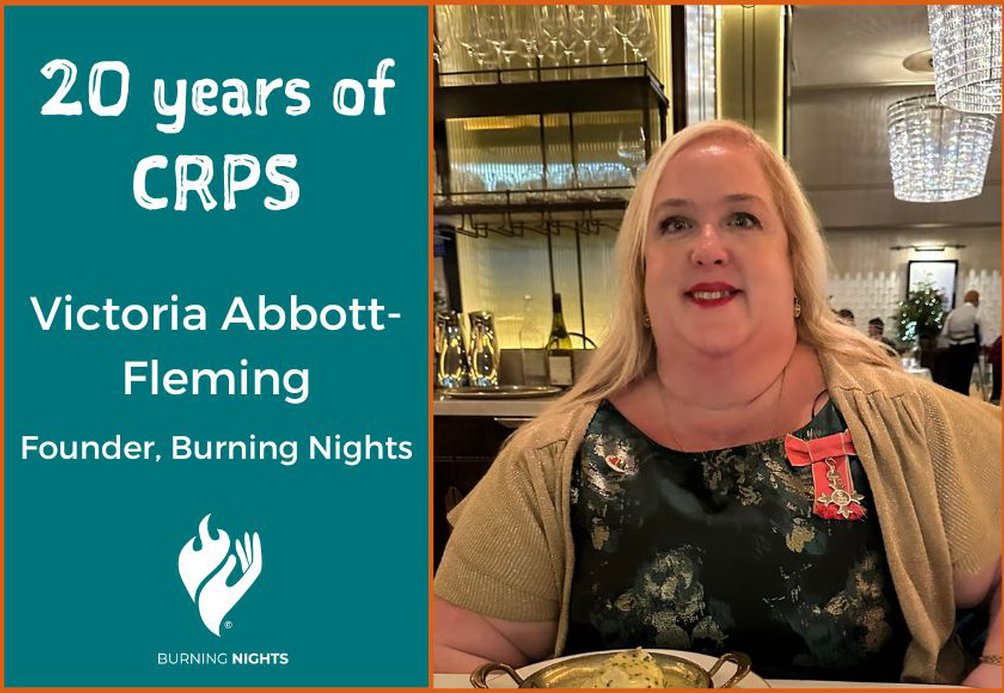We use cookies to improve your experience. By accepting you agree to our cookie policy

It is 20 years since Victoria Abbott-Fleming MBE, the founder of Burning Nights CRPS Support, experienced the first symptoms of Complex Regional Pain Syndrome.
Victoria has previously shared her personal story of CRPS diagnosis and now looks back on her journey with the condition over the last two decades.

I had an accident at work in November 2003 when I slipped down about 30 concrete stairs. My right lower leg was very bruised and swollen. The skin was tight and shiny, and I was in a lot of pain.
After repeated trips to both the hospital and my GP, I was told that I hadn’t broken any bones but had suffered some soft tissue damage in my leg.
The pain did not go away though - it was intense, burning, and stabbing. It went on, day-in and day-out.
I went from doctor to doctor, clinic to clinic, hospital to hospital (both NHS and Private). I needed to find out why I was in so much pain and, most importantly, what I could do about it.
I saw at least 39 different doctors and specialists until in April 2004 - nearly 6 months after my initial injury - I was finally referred to our local hospital’s pain clinic.
It was there that I first heard of Complex Regional Pain Syndrome.
I was told that I was most likely going to have it for life, although the doctor couldn’t be sure, and his only advice was to take antioxidant vitamins.
When I had my first flare, I didn't know what was happening ... knowing more about the condition would have made such a difference.
I wish I’d known about flare ups. Not just what they are, but how long they can last, how to handle them, and what’s ‘normal’.
When I had my first flare, I didn’t know what was happening. My leg was even more on fire than usual, the pain was extreme. I couldn’t stop my leg from tremoring.
I felt unable to cope: I was crying, screaming, and couldn’t sit still.
I had no idea how long this extra pain and fire were going to plague me. All my husband could do was try and comfort and be near me. He was suffering too and, afterwards, I felt selfish and angry at myself.
When I was first diagnosed, knowing more about the condition itself would have made such a difference. I believe understanding CRPS would have allowed me to reach acceptance of it much sooner. Insight into the stages of acceptance would have been incredibly useful too – knowledge of the anger and bargaining stages in particular would have helped on my journey to acceptance.
I'm passionate about patients and their families having access to high-quality information about CRPS - and being offered long-term counselling and psychological support.
If I had been diagnosed sooner and treated quicker, then I may not have needed my first amputation. I can’t know that for certain but, looking back, all the signs and symptoms of CRPS were right there.
The chance to trial the Spinal Cord Stimulator (SCS) at an earlier stage in the development of my condition might have avoided the irreversible ulceration and skin breakdown on my leg. But this is speculation and hindsight, or perhaps just wishful thinking!
If I’d been taught about CRPS after my diagnosis so that I understood it, its effects, and, crucially, how to manage them, this would have made a huge difference.
I just didn’t understand what my body was going through, nor how the various treatments would work, nor what to expect with issues like flare-ups
I’m passionate about patients - and their families - being properly educated about CRPS. They need to know what is going on in their body; what is causing the symptoms and flare-ups. Guidance around the self-management of pain can really help.
From the beginning I should have had access to long-term counselling or psychotherapy to help get me through life with CRPS. It’s not easy learning to live with a long-term, extremely debilitating, and painful condition. At various points during my 20-years of CRPS, my mental health has hit rock-bottom. It’s crucial to me that Burning Nights offers direct support to those with CRPS, especially people coming to terms with their condition.
Over my two decades of living with CRPS, the biggest change has been in awareness.
When I was first diagnosed no-one - including many health professionals - had heard of it.
It took me 6-7 months, and almost 40 different doctors and healthcare professionals, to be diagnosed. Even then, those treating me didn’t understand the effects of CRPS or how to manage them.
Hospitals I visited never had a leaflet on, or information about, the condition. You rarely saw anything on the internet about it, and you certainly never heard anything on the TV or radio.
Now, 20 years later, more people than ever are talking about CRPS - although there are still far too many in the medical world who know little about it.
All of us at Burning Nights CRPS Support are passionate about encouraging – and often insisting upon – discussion on the condition in the public domain.
As a result, there are hospitals, trusts, and ICBs (Integrated Care Boards formerly CCG’s) that do offer information on CRPS. There is also good advice on how to live with and manage it.
For those affected today, there is a greater opportunity to learn about CRPS, draw on the experiences of others, and advocate for oneself - which is crucial when you have a rare condition like this one.
There are UK guidelines for the diagnosis of CRPS too. The first version, from the Royal College of Physicians, was not published until 2012 – 9 years after I first experienced symptoms! Those suffering are diagnosed more quickly today (but still not fast enough) and can receive relevant and appropriate treatment.
A significant development in treatment options is neuromodulation, including the introduction of Dorsal Root Ganglion Stimulation (DRG). There have also been vast improvements in Spinal Cord Stimulators - even just over the 18 years since I had one implanted.
Another important change has come in the focus on the self-management of pain. Following the introduction of The Pain Toolkit, created by Pete Moore and Dr. Francis Cole, there’s been a push towards evidence-based information on pain management. Helping people understand their chronic pain, and offering guidance on managing it, has directly improved the quality of everyday life for CRPS warriors.
I want all healthcare professionals to know about and understand CRPS.
Despite the progress, it still takes too long to be diagnosed with CRPS.
Over the next 20 years, I hope that CRPS becomes a condition that all healthcare professionals know about and understand. We will continue to strive for this at Burning Nights CRPS Support with informative literature and awareness training sessions.
I feel particularly strongly about the lack of psychological support for those faced with a diagnosis or living long-term with CRPS, including their family and loved ones. This needs to change. We are continually developing the CRPS counselling service offered by the charity. Stories like Maddie's, a young carer, show what a difference counselling can make -,but it's a battle to get the funding we need to keep up with demand.
I also hope for a diagnostic test within the next 20 years - and that we have access to treatments developed specifically for CRPS. There has been an increase in scientific research on the condition but more studies are essential to understand its cause, and refine, and personalise, the treatment options available.
The last 20 years have been a rollercoaster of pain, emotions, struggles, plus a few significant highs along the way.
I’m so glad that I have had the opportunity to set up Burning Nights CRPS Support: I’m super-proud of all the achievements we’ve made and the progress we continue to make.
But the greatest help has to be the support of my husband, Michael. We’ve been together since February 1999 and he knew me before my initial accident.
He’s been there through both the good times and the bad. We’ve both had to learn about the condition and how he can help me through flares - and all the other challenges of CRPS.
I know that I’m extremely lucky to have Michael. He’s seen me through the course of this condition, as our marriage vows said: “in sickness and in health.”
Burning Nights is here for you whenever you need help - whether you are facing a diagnosis, have lived with CRPS for years, or care for someone with the condition.
You are not alone.
We use cookies to improve your experience. By accepting you agree to our cookie policy
 £
£